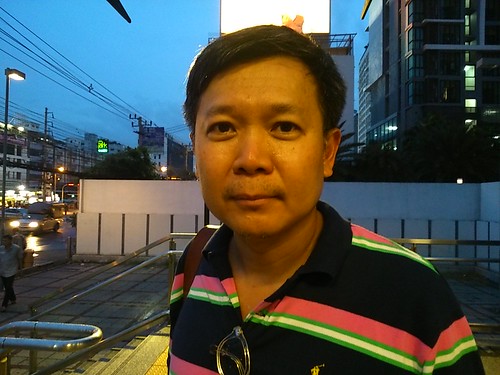Pravit spoke to Prachatai about his second period of detention by the junta, caused by two social media posts. One of the posts was his own tweet about the legitimacy of General Prayut Chan-o-cha’s rule. The second item was a three-page message on the messaging app Line regarding the appointment of secretaries in the Office of the National Security Council. Pravit has denied writing the second post.
Pravit’s most recent detention lasted from 13 to 15 September, from Sunday until Tuesday. After about an hour of interrogation, Pravit was brought to an army base, where he was asked about his political stance, his affiliations with political groups and human rights organizations, and his reasons for disagreeing with Article 112, the lèse majesté law. Pravit said he denied being a red shirt or a follower of Thaksin Shinawatra, just that he did not agree with the junta rule. As for Gen Prayut Chan-o-cha, Pravit said he did not hold any personal grudges against him, but expressed his opinions according to his principles. Moreover, Pravit even disagreed with rhetoric mocking Prayut’s physical features.
During his interrogation, Pravit found that the military officials were deeply concerned with social media.
“They were paranoid about tweets, not even published news in The Nation,” said Pravit, who has become something of a popular speaker for his stance due to his many retweets. “People who hate me are blowing what I do way out of proportion,” he said, saying that the military were overreacting.
After being interrogated at the army base from 15:30-21:00, Pravit was transported in a van for a little over an hour to another location. During the ride, Pravit was blindfolded with a cloth, so he did not know where he was taken to.
He arrived in a room 4x4 meters wide, lit only by a neon light. All sources of natural light were blocked out. There was a surveillance camera in the room as well as a TV that only had Channel 3 and Thai PBS. A floor air conditioner stood with a sign saying “Kanchanaburi,” and there was also drinking water. The door was locked.
Around 7-8 on Monday morning, food was brought to him. (He had been asked about meal options when he was still being held in Bangkok.)
For the first 20 hours, Pravit did not get to talk to anyone, save for when he knocked on the door and asked to go out and get some fresh air. He felt that there was not enough air in the room. He was allowed to sit outside six times, but he had to be blindfolded the entire time he was outside of his room. This was markedly different from his first detention, when he was allowed to walk around freely in the camp and even play soccer with the guards.
Pravit’s first military detention was in May 2014, two days after the coup d’état, when the junta’s National Council for Peace and Order (NCPO) detained him at an army base in Ratchaburi Province for a week.
On Monday night, a high-ranking military officer came to talk to Pravit about politics, and whether Pravit wanted anything. Pravit answered that he wanted some sun, air, and shampoo.
Next morning, he got some “air” when he was allowed to sit facing away from the open door for around 30 minutes.
At about 2 pm on Tuesday, a document ordering him to cease all political activities was brought for him to sign. Then Pravit was brought back to the first army base, arriving there blindfolded at around 3 pm.
There, Pravit was brought before a high-ranking military officer who informed him that a report had been filed against him, but the case had not proceeded yet and would be put on hold because “we’re all Thais here.” The officer emphasized that if Pravit disobeyed the NCPO’s orders again, then they would proceed with the case. Pravit was not informed about what case exactly was filed against him, only that the limitation of the charge is 15 years in jail.
“Although I wasn’t tortured, but I was severely intimidated and infringed upon,” said Pravit.
The officer offered to drop off Pravit at his home, but Pravit asked him to drop him off at a BTS skytrain station instead.
The day after his release, Pravit was pressured by The Nation Group to
resign from his job of 23 years at The Nation.

